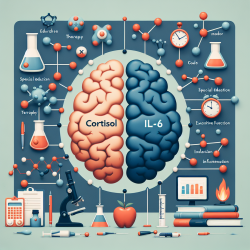Introduction
In the realm of speech-language pathology and online therapy services, understanding the factors that influence emotional and cognitive outcomes in children is paramount. Recent research by Newman et al. (2022) titled Asymmetrical Effects of Sleep and Emotions in Daily Life provides valuable insights into the bidirectional relationships between sleep, emotions, and daily events. This blog post explores how practitioners can leverage these findings to enhance therapeutic outcomes for children.
The Study: Key Findings
The study utilized a daily diary method to assess the interactions between sleep, daily events, and emotions among 181 mothers over a period of 21 days. The researchers found that longer sleep duration and better sleep quality were associated with increased positive emotions and decreased negative emotions upon waking. Conversely, negative affect in the evening and perceived stressfulness during the day predicted poorer sleep quality that night. These findings highlight the stronger bidirectional relationships between sleep and daily stress compared to daily positivity.
Implications for Practitioners
For practitioners working with children, these findings underscore the importance of considering sleep patterns when addressing emotional and behavioral challenges. Here are some practical applications:
- Monitor Sleep Patterns: Encourage parents to track their children's sleep patterns, noting both duration and quality. This data can be used to identify potential correlations between sleep disturbances and emotional or behavioral issues.
- Integrate Sleep Hygiene Education: Educate families about the importance of good sleep hygiene practices, such as maintaining a consistent bedtime routine, creating a conducive sleep environment, and limiting screen time before bed.
- Address Evening Stressors: Help families identify and mitigate evening stressors that may impact sleep quality. Techniques such as mindfulness or relaxation exercises can be beneficial.
- Collaborate with Other Professionals: Work closely with pediatricians, psychologists, and other professionals to develop comprehensive intervention plans that address both sleep and emotional health.
Encouraging Further Research
While the study provides valuable insights, it also opens avenues for further research. Practitioners are encouraged to explore the following areas:
- Longitudinal Studies: Conduct long-term studies to assess the impact of sleep interventions on emotional and cognitive outcomes in children.
- Exploration of Positive Events: Investigate the potential role of positive daily events in enhancing sleep quality and emotional resilience.
- Broader Demographics: Expand research to include diverse populations and age groups to enhance the generalizability of findings.
Conclusion
Understanding the intricate relationship between sleep, emotions, and daily events is crucial for practitioners aiming to improve therapeutic outcomes for children. By integrating these research findings into practice, professionals can better support the emotional and cognitive development of their young clients. To read the original research paper, please follow this link: Asymmetrical Effects of Sleep and Emotions in Daily Life.










